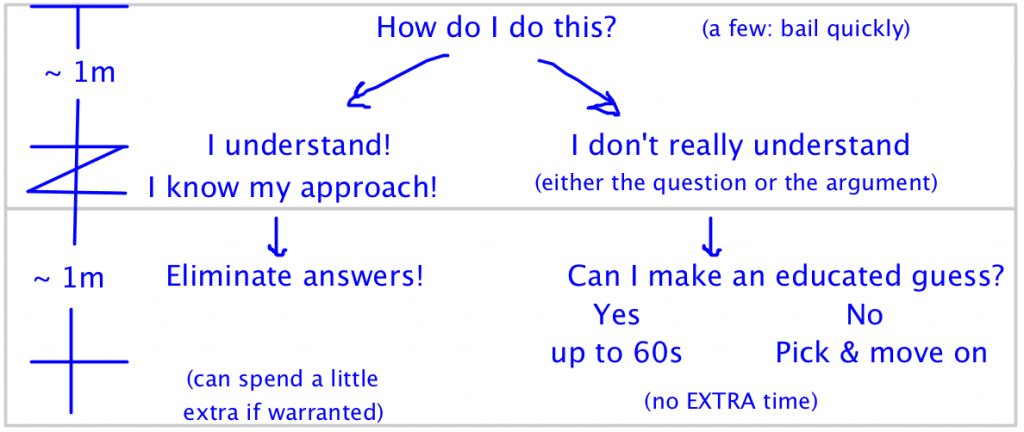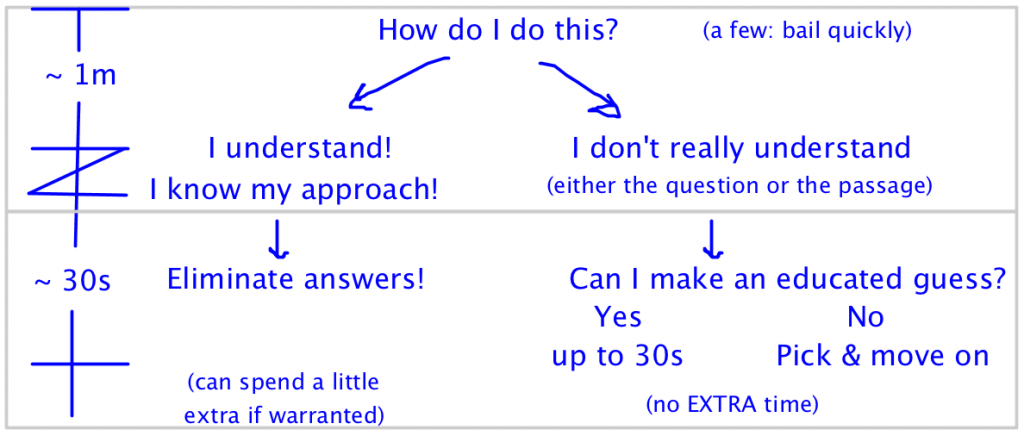-
Target Test Prep's 2024 GMAT Focus Edition prep is discounted for the BTG community!
Redeem
Keep Going? Bail? Decision Making on GMAT CR and RC - Part 3/3
 In this series, were talking about decision-making and time management on the GMAT. If you havent read the earlier installments, start with part 1 first and work your way back here.
In this series, were talking about decision-making and time management on the GMAT. If you havent read the earlier installments, start with part 1 first and work your way back here.
In the first part of the series, we talked about quant, and in part two, we addressed SC. Today, were going to dive into Critical Reasoning and Reading Comp.
The CR/RC Decision Tree
Youre going to use the same general decision tree that we used for quant and SC; the details are just tweaked to match this question type. (Note: all times below are approximate. Don't worry about 10 or 15 seconds here and there.)
Also note that CR questions should average about 2 minutes. The initial read-through of an RC is ideally 2 to 3 minutes (though may be longer for some). Aim to average about 1 minute for RC main idea questions and about 1.5 minutes for detail questions.
One more note: all times below do not include the time taken to read an RC passage in the first place.
(1) Im out of here
I hate this type so much that I decided before the test even started that I would guess immediately on these problems. For CR, that would be a specific question type (for example, boldface!). For RC, that could be a combination of passage topic and question type (for example, science topic + inference) or a less-common question type (for example, Except questions).
Decision: Pick my favorite letter right now and move on
Time taken to make decision: About 10 to 20 seconds
(2) I get it
I understand the CR argument / main idea of the RC passage, as well as the purpose of each RC paragraph.
(2a) Ive identified the question type, I know what Im supposed to be analyzing, and (for RC) I know where to look in the passage.
Decision: Start eliminating! I get it, so I can choose to spend a little extra time if this one is longer / harder than average
CR time taken to make decision: About 1 minute (+ up to another 90 seconds to keep eliminating)
RC time taken to make decision on question: About 30 to 60 seconds (+ up to another 60 seconds to keep eliminating)
(2b) Ive identified the question type, but Im not totally sure what Im supposed to be analyzing or Im not sure that Im looking in the right place in the passage.
Decision: Ill keep going for a little while, but Im not going to spend extra time on this one unless I suddenly realize I totally get it.
CR time taken to make decision: About 1 minute (+ up to another 60 seconds to keep eliminating)
RC time taken to make decision on question: About 30 to 60 seconds (+ up to another 30 seconds to keep eliminating)
(2c) I cant identify the question type or (for RC) I dont know where to look in the passage.
Decision: Can I eliminate any answers as obviously incorrect? Then I guess and move on.
CR time taken to make decision: About 1 minute (+ up to another 30 seconds to keep eliminating)
RC time taken to make decision on question: About 30 to 60 seconds (+ up to another 30 seconds to keep eliminating)
(3) Huh?
I dont understand the CR argument or question, even after reading it twice. On RC, Im having trouble understanding the main idea or Im totally lost on the detail or the question makes no sense.
Decision: If I understand a little, can I eliminate any answers as obviously incorrect? If so, go for it. If Im already pressed for time though, or Im totally lost, then I pick my favorite letter right now and move on.
CR time taken to make decision: About 1 minute (+ up to another 15 to 30 seconds to eliminate)
RC time taken to make decision on question: About 30 to 60 seconds (+ up to another 15 to 30 seconds to eliminate)
Lets talk about how the 1-minute time sense plays out for each of these question types.
Whats a 1-minute time sense?
Its the ability to know that you started working on the problem approximately one minute agowithout actually having to look at the clock every minute. Youre going to train yourself to know roughly how long one minute is!
If you havent already, read part 1 of this series to learn how to develop your 1-minute time sense.
The decision tree and the 1-minute time sense for CR
Heres what youre going to do.
CR is like quant: the 1-minute mark is about the halfway mark, so you still have a little time to figure out a way forward.
At the 1-minute mark, you have to know what kind of CR sub-type you have (and the general strategy for answering that sub-type). You also have to understand the argument: if it has a conclusion, youve identified it, and so on. If so, you can keep going on the problem (though be willing to bail if you get stuck later on).
If those things havent happened by the 1-minute mark, then its time to change tactics. Youre no longer trying to get to the right answer. Instead, youre looking to eliminate any answers that are obviously wrong to you; then youll guess from among the remaining answers and move on.
Just a note: on any verbal problem, if you find yourself agonizing back and forth (and back and forth) among the answers, stop. Youre stuck. Pick something and move on.
The decision tree and the 1-minute time sense for RC
RC main idea questions should take only about 1 minute on average, so you should be just about down when the 1-minute sense kicks in. You may still need to evaluate a couple of answers, but thats all.
If the end is not in sight, guess from among the remaining answers and move on.
Questions that require you to get into the details, on the other hand, are a bit more complex. These types include specific detail, inference, authors purpose (or why), Except, strengthen, and weaken. Heres what youre going to do.
At the 1-minute mark, you have to understand the question and know what specific text in the passage you need to answer the question. You also have to feel comfortable with that text. If so, go ahead and try to paraphrase an answer in your own words, then look for a match in the answer choices.
If you know you didnt understand the relevant text when you were reading it initially, you can try to read it once more, but dont hang on if you still find it confusing. Switch to guessing mode.
Note: CR and RC guessing strategies can differ. For instance, its not very common for a correct RC answer to have an extreme word in it, so if you have to guess, dont pick an answer that contains an extreme word. That strategy does not work for CR, where its not necessarily uncommon for the correct answer to contain an extreme word.
How long will it take to master this?
As with the other question types, expect to spend a solid 4 to 6 weeks working through and practicing the different pieces before it starts to come together and feel more natural.
Heres a short cheat sheet to help you remember the major process for each type.
Thats a lot to remember
Yes, it is. Practice will help you to internalize these decision-making processes. Note, though, that while Ive laid everything out in excruciating detail to help you know what to do (and why), this stuff can be summarized into the Principles of the Business Mindset. Here they are.
By about the 1-minute mark, if you are going to continue to work on this problem, you should know whats going on and feel comfortable with the problem. For some types (quant, CR), you will have some substantial work still to do, but the set-up should be clear in your mind. For others (SC, RC), you should be closer to finished and feeling good about what youve already done.
If those things are not true, then its time to change tactics: see whether you can make an educated guess. If so, spend a small amount of time doing so. If not, guess and move on immediately.
On a small number of questions (typically about 4 to 7 per section for quant and verbal), you can guess immediately and move on. Determine your biggest weaknesses before going into the test so that you know exactly how to make that decision.
Personally, I hate combinatorics and 3-D geometry; Im going to guess immediately if I see those. I also have certain problem characteristics that I dislike; if I see enough of them piled into one problem, I may skip that one as well. For instance, Im not a huge fan of roman numeral problems (3 for the price of 1!), absolute value, or 4+ variables. If one problem contains all of those characteristicsthen Im a lot less interested in trying to answer that thing.
Note that you do need to take into account how often something is tested. Want to skip all CR Evaluate questions? Feel free; youll typically see only 1 on the test. Want to skip all CR Assumption Family questions? Probably not a good ideayoure likely to see 6 or 7 assumption family questions on the test. That would take up all of your potential skips!
Finally, remember for verbal that, if you find yourself just agonizing back and forth among a few choices, youre done with that problem. Pick one of the remaining answers and move on. (Struggling to let go? Go back to the Master the Business Mindset article and keep reinforcing.)
Good luck and happy studying!
Recent Articles
Archive
- May 2024
- April 2024
- March 2024
- February 2024
- January 2024
- December 2023
- November 2023
- October 2023
- September 2023
- July 2023
- June 2023
- May 2023
- April 2023
- March 2023
- February 2023
- January 2023
- December 2022
- November 2022
- October 2022
- September 2022
- August 2022
- July 2022
- June 2022
- May 2022
- April 2022
- March 2022
- February 2022
- January 2022
- December 2021
- November 2021
- October 2021
- September 2021
- August 2021
- July 2021
- June 2021
- May 2021
- April 2021
- March 2021
- February 2021
- January 2021
- December 2020
- November 2020
- October 2020
- September 2020
- August 2020
- July 2020
- June 2020
- May 2020
- April 2020
- March 2020
- February 2020
- January 2020
- December 2019
- November 2019
- October 2019
- September 2019
- August 2019
- July 2019
- June 2019
- May 2019
- April 2019
- March 2019
- February 2019
- January 2019
- December 2018
- November 2018
- October 2018
- September 2018
- August 2018
- July 2018
- June 2018
- May 2018
- April 2018
- March 2018
- February 2018
- January 2018
- December 2017
- November 2017
- October 2017
- September 2017
- August 2017
- July 2017
- June 2017
- May 2017
- April 2017
- March 2017
- February 2017
- January 2017
- December 2016
- November 2016
- October 2016
- September 2016
- August 2016
- July 2016
- June 2016
- May 2016
- April 2016
- March 2016
- February 2016
- January 2016
- December 2015
- November 2015
- October 2015
- September 2015
- August 2015
- July 2015
- June 2015
- May 2015
- April 2015
- March 2015
- February 2015
- January 2015
- December 2014
- November 2014
- October 2014
- September 2014
- August 2014
- July 2014
- June 2014
- May 2014
- April 2014
- March 2014
- February 2014
- January 2014
- December 2013
- November 2013
- October 2013
- September 2013
- August 2013
- July 2013
- June 2013
- May 2013
- April 2013
- March 2013
- February 2013
- January 2013
- December 2012
- November 2012
- October 2012
- September 2012
- August 2012
- July 2012
- June 2012
- May 2012
- April 2012
- March 2012
- February 2012
- January 2012
- December 2011
- November 2011
- October 2011
- September 2011
- August 2011
- July 2011
- June 2011
- May 2011
- April 2011
- March 2011
- February 2011
- January 2011
- December 2010
- November 2010
- October 2010
- September 2010
- August 2010
- July 2010
- June 2010
- May 2010
- April 2010
- March 2010
- February 2010
- January 2010
- December 2009
- November 2009
- October 2009
- September 2009
- August 2009

